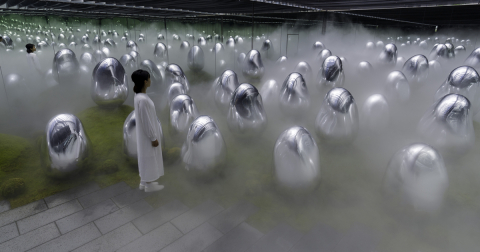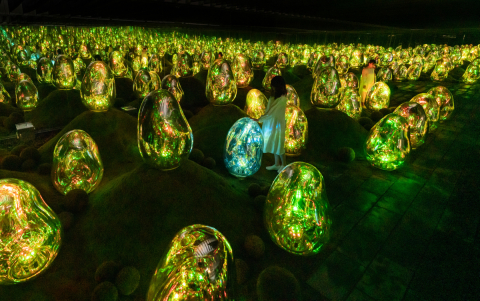
teamLab Planets in Tokyo Unveils Two New Immersive Living Garden Artworks on July 2
A museum where visitors walk through water becomes even more immersive with the addition of an interactive garden of 13,000 live orchids blooming in mid-air, and an ever-changing moss garden with glowing ovoids resonating with light and sound.
-
teamLab Planets in Tokyo Unveils Two New Immersive Living Garden Artworks on July 2
-

teamLab Planets in Tokyo Unveils Two New Immersive Living Garden Artworks on July 2
-

teamLab Planets in Tokyo Unveils Two New Immersive Living Garden Artworks on July 2
-

teamLab Planets in Tokyo Unveils Two New Immersive Living Garden Artworks on July 2
TOKYO--(Business Wire / Korea Newswire)--teamLab Planets TOKYO in Toyosu, Tokyo is celebrating its third anniversary with an expansion: on July 2, the museum opens a new Garden Area with two interactive garden artworks.
Two gardens will open to the public: a garden where visitors can become one with the flowers, immersing themselves in over 13,000 live orchids that bloom in mid-air; and a moss garden filled with ovoids that shine and resonate when pushed by people or blown by the wind.
Consisting of nine artworks, including four gigantic art spaces and two gardens, teamLab Planets transports visitors to an immersive experience in a museum where they walk through water and a garden where they become one with the flowers.
teamLab Planets Highlight Video: https://youtu.be/-uJTk_mRmUY
teamLab Planets
teamLab Planets is a museum where you walk through water, and a garden where you become one with the flowers. There are a total of ten artworks, including four massive exhibition spaces and two gardens.
By immersing the entire body with other people in these massive body immersive artworks, the boundary between the body and the artwork dissolves, the boundaries between the self, others, and the world become continuous, and we explore a new relationship without boundaries between ourselves and the world.
Visitors enter the museum barefoot and become completely immersed with other visitors in the vast artwork spaces.
Exhibition Details: planets.teamlab.art/
[Garden Area (2 Garden Artworks)]
Floating Flower Garden; Flowers and I are of the Same Root, the Garden and I are One
teamLab, 2015, Interactive Kinetic Installation, Endless, Sound: Hideaki Takahashi
Artwork: https://planets.teamlab.art/tokyo/ew/ffgarden_planets/
This floating flower garden consists of a three-dimensional mass of flowers.
The flowers float up above people, and when the people move, the flowers descend again. The artwork space is completely filled with flowers, but as they float up, spaces with people at the center are created. Because of this, people are able to freely wander around the three-dimensional flower mass space. If you encounter other people within the artwork, your space will connect with theirs and become one single space.
Zen gardens are said to have been created as a place for groups of Zen priests to carry out training in order to become one with nature. There is a Chinese Zen kōan (a question or story that is part of Zen priests’ theological training) called, “Nansen’s Flower.” A man named Rikukô Taifu, while talking with Nansen, said: “Jô Hoshi says, ‘Heaven and I are of the same root. All things and I are of the same substance.’ How wonderful this is! Nansen, pointing to a flower in the garden said, ‘People these days see this flower as if they were in a dream.’”
In this work, people immerse themselves in flowers, becoming one with the garden. When people become one with the flowers and look at them, the flowers look back. People may truly look at flowers for the first time.
The flowers blooming in the air are epiphytic orchids. Epiphytic plants are extremely common in the orchid family, and epiphytic orchids are able to grow without dirt by absorbing water from the air. The flowers in this artwork are alive, growing, and blooming with each passing day.
Orchids are said to be the last plants to appear on earth. The ground was already covered by other plants, and orchids evolved to live on rocks and trees where other plants could not survive. Orchids adapt and diffuse in a short period of time, and it is said that there are 25,000 to 30,000 kinds of wild species alone. It is believed that there are more types of orchid than any other plant. However, many species are endangered due to the loss of their habitat or overexploitation due to development.
Orchid seeds are as fine as dust, with only immature embryos, no endosperm, and little storage nutrients. In nature, germination of the seed requires symbiosis with a specific fungus, and the symbiotic fungus supplies the nutrients. The seeds have no reserve for germination and cannot sprout themselves, which would seem to contradict the very notion of what a seed is. Seeds should also be a nutrient storehouse for seedlings to germinate, yet the last orchid species to appear on earth has abandoned this aspect. It causes us to wonder why evolution takes certain paths.
Orchids are known to have co-evolved with certain pollen-carrying insects, and it is believed that they continue to evolve rapidly today. The time at which the flowers in the artwork space strengthen in aroma varies according to the time at which these partner insects are active. Because of this, the scent of the artwork space changes each moment between morning, day, and night.
Moss Garden of Resonating Microcosms- Solidified Light Color, Sunrise and Sunset
teamLab, 2021, Interactive Digital Installation, Endless, Sound: Hideaki Takahashi
Artwork: https://planets.teamlab.art/tokyo/ew/resonating_microcosms_mossgarden_planets/
With sunrise, the ovoids begin to reflect the world around them. When pushed down by a person or blown by the wind, the ovoids fall back and then rise, releasing a resonating tone. The ovoids around it also respond one after another, continuing to resonate with the same tone.
As the sun sets, the ovoids shine by themselves. When an ovoid is pushed by a person or blown by the wind, it falls down and then rises, a sound resonates out, and it emits a light color specific to the sound. The ovoids around it also respond one after another, making the same tone sound, and emitting the same light color that continues to resonate out.
The ovoids begin to flicker slowly when the wind is quiet and people do not push them. Because the ovoid colors are produced by light, it is possible for them to change into 61 different solidified light colors.
[The Following Artworks are Still On View]
Drawing on the Water Surface Created by the Dance of Koi and People - Infinity
teamLab, 2016-2018, Interactive Digital Installation, Endless, Sound: Hideaki Takahashi
Artwork: https://planets.teamlab.art/tokyo/ew/koi_and_people/
Artwork Video: https://youtu.be/qAebQICA-fE
The Infinite Crystal Universe
teamLab, 2018, Interactive Installation of Light Sculpture, LED, Endless, Sound: teamLab
Artwork: https://planets.teamlab.art/tokyo/ew/infinite_crystaluniverse/
Artwork Video: https://youtu.be/b0BboQnqT_4
Floating in the Falling Universe of Flowers
teamLab, 2016-2018, Interactive Digital Installation, Endless, Sound: Hideaki Takahashi
Artwork: https://planets.teamlab.art/tokyo/ew/fitfuof/
Artwork Video: https://youtu.be/ZCFsCHLGFlM
Expanding Three-Dimensional Existence in Transforming Space - Flattening 3 Colors and 9 Blurred Colors, Free Floating
teamLab, 2018, Interactive Installation, Endless, Sound: Hideaki Takahashi
Artwork: https://planets.teamlab.art/tokyo/ew/transformingspace/
Artwork Video: https://youtu.be/je04z4596Xc
*Including the above four massive artwork spaces, teamLab Planets is a museum where you walk through water, and a garden where you become one with the flowers.
[Exhibition Summary]
teamLab Planets TOKYO
https://planets.teamlab.art/tokyo/
#teamLabPlanets
Term: July 7, 2018 - End of 2022
Venue: teamLab Planets TOKYO (6 Chome-1-16 Toyosu, Koto City, Tokyo)
Hours:
June: Mon - Fri 10:00 - 18:00 / Sat, Sun, Holidays 09:00 - 19:00
*Last entry 30 minutes before closing
July: Mon - Fri 10:00 - 20:00 / Sat, Sun, Holidays & July 22 - 31 09:00 - 20:00
*Last entry 1 hour before closing
Closed: July 1, July 20
Admission:
Entrance Pass
Adults (ages 18 and older): JPY 3,200
University / Trade School Students: JPY 2,500
Middle School / High School Students: JPY 2,000
Children (ages 4 - 12): JPY 300
Infants (ages 3 and younger): Free
Seniors (ages 65 and older): JPY 2,400
Visitors with Disabilities: JPY 1,600
teamLab Planets TOKYO Ticket Store: https://teamlabplanets.dmm.com/en
*Admission and exhibition hours are subject to change. Please check the official website for the latest information.
Official Social Media Pages:
Instagram: https://www.instagram.com/teamlab.planets/
Facebook: https://www.facebook.com/TL.Planets/
Twitter: https://twitter.com/teamLabPlanets
Measures Against the Spread of COVID-19:
Infection prevention measures such as entry restrictions are being implemented. Please check the website for details.
https://teamlabplanets.dmm.com/en/covid-19
[Press Kit]
https://goo.gl/tQXMLm
[Media Inquiries]
https://goo.gl/forms/fqn8DmGV8WWIntP53
[PLANETS Co., Ltd.]
The managing entity for facilities operations at teamLab Planets TOKYO
Address: Tokyo Nihonbashi Tower 26F, 2-7-1 Nihonbashi, Chuo-ku, Tokyo
[About teamLab]
teamLab (f. 2001) is an international art collective, an interdisciplinary group of various specialists such as artists, programmers, engineers, CG animators, mathematicians and architects whose collaborative practice seeks to navigate the confluence of art, science, technology, and the natural world.
teamLab aims to explore the relationship between the self and the world and new perceptions through art. In order to understand the world around them, people separate it into independent entities with perceived boundaries between them. teamLab seeks to transcend these boundaries in our perception of the world, of the relationship between the self and the world, and of the continuity of time. Everything exists in a long, fragile yet miraculous, borderless continuity.
teamLab has been the subject of numerous exhibitions at venues worldwide, including New York, London, Paris, Singapore, Silicon Valley, Beijing, Taipei, and Melbourne among others. The permanent museums teamLab Borderless opened in Odaiba, Tokyo in June 2018, and teamLab Borderless Shanghai in Huangpu District, Shanghai in November 2019. The massive body immersive space teamLab Planets in Toyosu, Tokyo is on view until the end of 2022. The large-scale permanent exhibition teamLab SuperNature soft opened in Macao in June, 2020. teamLab’s annual life-work exhibition, VOLVO teamLab: A Forest Where Gods Live, will be on view in Mifuneyama Rakuen, Takeo Hot Springs, Kyushu starting July 16.
teamLab’s works are in the permanent collection of the Museum of Contemporary Art, Los Angeles; Art Gallery of New South Wales, Sydney; Art Gallery of South Australia, Adelaide; Asian Art Museum, San Francisco; Asia Society Museum, New York; Borusan Contemporary Art Collection, Istanbul; National Gallery of Victoria, Melbourne; and Amos Rex, Helsinki.
teamLab is represented by Pace Gallery, Martin Browne Contemporary, and Ikkan Art.
teamLab: https://www.teamlab.art/
Instagram: https://instagram.com/teamlab/
Facebook: https://www.facebook.com/teamLab.inc
Twitter: https://twitter.com/teamLab_net
YouTube: https://www.youtube.com/c/teamLabART
View source version on businesswire.com: https://www.businesswire.com/news/home/20210629005465/en/
Website: https://planets.teamlab.art/tokyo/
View Korean version of this release
Contact
PLANETS Co., Ltd.
Shusuke Sasahara
Public Relations
This is a news release distributed by Korea Newswire on behalf of this company.

